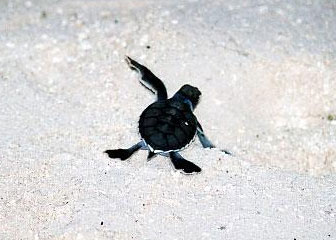Historic Caribbean sea turtle population falls 99%
Historic Caribbean sea turtle population falls 99%
Plunge has significant ecological consequences
mongabay.com
August 1, 2006
Current conservation assessments of endangered Caribbean sea turtles are too optimistic due declines of populations on historically important nesting beaches, according to new research from the Scripps Institution of Oceanography.
The study, published in the August issue of Frontiers in Ecology and the Environment, says that while “conservation efforts since the 1970’s have dramatically helped increase green and hawksbill turtle populations that nest on protected beaches… 20 percent of historic nesting sites have been lost entirely due to land development and turtle exploitation, and another 50 percent of the remaining sites have been reduced to dangerously low populations.”
 Hatchling sea turtle. Photo by N. Butler Sex sells sea turtle conservation in Mexico Mexican authorities announced they will use posters of scantily dressed young women to promote the protection of endangered sea turtles. The promotion comes just weeks after some 80 protected Olive Ridley sea turtles were found chopped to pieces on Escobilla beach in Oaxaca, Mexico. Sea turtles protected in Costa Rica are killed in Nicaragua Sea turtles that receive the highest protection in Costa Rica and other neighboring countries are dying by the thousands at the hands of unregulated – and unsustainable – commercial fishing in Nicaragua, according to a study by the Bronx Zoo based Wildlife Conservation Society. |
“The loss of even a single nesting site makes a permanent, irreversible dent in the sea turtle population,” said Loren McClenachan, who conducted the research with Jeremy Jackson and Marah Newman of the Scripps Institution of Oceanography.
The researchers estimate that turtle populations have declined significantly since the 17th century, with the number of green turtles living throughout the Caribbean falling from 91 million to 300,000 today and the population of Hawksbill turtles plunging from 11 million to less than 30,000 during this same time period. The change represents a 99.7 percent drop in historic Caribbean sea turtle populations for the two species.
McClenachan and colleagues suggest that the loss of nesting sites and nesting populations due hunting contribute to the decline. They say that the reestablishment of lost nesting sites is “extremely unlikely” but that more protection is needed for existing sea turtle nesting sites.
Ecological impact
The decline in sea turtles has had consequences for other marine life in the Caribbean. The researchers say that sea turtles, as “ecosystem engineers”, shaped the environment around them by feeding on turtle grass (green turtles) and sponges (hawksbill turtles).
“The ecological extinction of green turtles transformed an ecosystem with diverse species of seagrass dominated by large herbivores into a detritus-based ecosystem dominated by overgrown monocultures of one species of grass,” said the researchers. “The decline in green turtles has led to a loss of productivity available to the animal food chain — including commercial reef fishes — reducing the protein-rich food available for the Caribbean people.”
The Scripps team says that hawksbill’s now eat less toxic sponges, a shift that could “ultimately affect the landscape of coral reefs” in the region.
This is a modified news release from WCS.